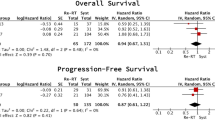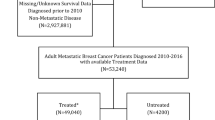Abstract
Aim
We aimed to investigate the impact of concurrent antibody–drug conjugates (ADC) and radiotherapy on symptomatic radiation necrosis (SRN) in breast cancer patients with brain metastases (BM).
Methods
This multicenter retrospective study uses four institutional data. Eligibility criteria were histologically proven breast cancer, diagnosed BM with gadolinium-enhanced MRI, a Karnofsky performance status of 60 or higher, and radiotherapy for all BM lesions between 2017 and 2022. Patients with leptomeningeal dissemination were excluded. Concurrent ADC was defined as using ADC within four weeks before or after radiotherapy. The cumulative incidence of SRN until December 2023 with death as a competing event was compared between the groups with and without concurrent ADC. Multivariable analysis was performed using the Fine-Gray model.
Results
Among the 168 patients enrolled, 48 (29%) received ADC, and 19 (11%) had concurrent ADC. Of all, 36% were HER2-positive, 62% had symptomatic BM, and 33% had previous BM radiation histories. In a median follow-up of 31 months, 18 SRNs (11%) were registered (11 in grade 2 and 7 in grade 3). The groups with and without concurrent ADC had 5 SRNs in 19 patients and 13 SRNs in 149, and the two-year cumulative incidence of SRN was 27% vs. 7% (P = 0.014). Concurrent ADC was associated with a higher risk of SRN on multivariable analysis (subdistribution hazard ratio, 3.0 [95% confidence interval: 1.1–8.3], P = 0.030).
Conclusions
This study suggests that concurrent ADC and radiotherapy are associated with a higher risk of SRN in HER2-positive breast cancer patients.



Similar content being viewed by others
Data availability
No datasets were generated or analysed during the current study.
References
Barbour AB, Jacobs CD, Williamson H et al (2020) Radiation Therapy Practice Patterns for Brain Metastases in the United States in the Stereotactic Radiosurgery Era. Adv Radiat Oncol 5:43–52. https://doi.org/10.1016/j.adro.2019.07.012
Gondi V, Bauman G, Bradfield L et al (2022) Radiation Therapy for Brain Metastases: An ASTRO Clinical Practice Guideline. Pract Radiat Oncol 12:265–282. https://doi.org/10.1016/j.prro.2022.02.003
Ladbury C, Pennock M, Yilmaz T et al (2024) Stereotactic Radiosurgery in the Management of Brain Metastases: A Case-Based Radiosurgery Society Practice Guideline. Adv Radiat Oncol 9:101402. https://doi.org/10.1016/j.adro.2023.101402
Murthy RK, Loi S, Okines A et al (2020) Tucatinib, Trastuzumab, and Capecitabine for HER2-Positive Metastatic Breast Cancer. N Engl J Med 382:597–609. https://doi.org/10.1056/NEJMoa1914609
Lin NU, Borges V, Anders C et al (2020) Intracranial Efficacy and Survival With Tucatinib Plus Trastuzumab and Capecitabine for Previously Treated HER2-Positive Breast Cancer With Brain Metastases in the HER2CLIMB Trial. J Clin Oncol 38:2610–2619. https://doi.org/10.1200/JCO.20.00775
Lin NU, Murthy RK, Abramson V et al (2023) Tucatinib vs Placebo, Both in Combination With Trastuzumab and Capecitabine, for Previously Treated ERBB2 (HER2)-Positive Metastatic Breast Cancer in Patients With Brain Metastases: Updated Exploratory Analysis of the HER2CLIMB Randomized Clinical Trial. JAMA Oncol 9:197–205. https://doi.org/10.1001/jamaoncol.2022.5610
Modi S, Saura C, Yamashita T et al (2020) Trastuzumab Deruxtecan in Previously Treated HER2-Positive Breast Cancer. N Engl J Med 382:610–621. https://doi.org/10.1056/NEJMoa1914510
Hurvitz SA, Hegg R, Chung W-P et al (2023) Trastuzumab deruxtecan versus trastuzumab emtansine in patients with HER2-positive metastatic breast cancer: updated results from DESTINY-Breast03, a randomised, open-label, phase 3 trial. Lancet 401:105–117. https://doi.org/10.1016/S0140-6736(22)02420-5
Ramakrishna N, Anders CK, Lin NU et al (2022) Management of Advanced Human Epidermal Growth Factor Receptor 2-Positive Breast Cancer and Brain Metastases: ASCO Guideline Update. J Clin Oncol 40:2636–2655. https://doi.org/10.1200/JCO.22.00520
Vogelbaum MA, Brown PD, Messersmith H et al (2022) Treatment for Brain Metastases: ASCO-SNO-ASTRO Guideline. J Clin Oncol 40:492–516. https://doi.org/10.1200/JCO.21.02314
Michelon I, Vilbert M, Marinho AD et al (2024) Trastuzumab deruxtecan in human epidermal growth factor receptor 2-positive breast cancer brain metastases: a systematic review and meta-analysis. ESMO Open 9:102233. https://doi.org/10.1016/j.esmoop.2024.102233
Lebow ES, Pike LRG, Seidman AD et al (2023) Symptomatic Necrosis With Antibody-Drug Conjugates and Concurrent Stereotactic Radiotherapy for Brain Metastases. JAMA Oncol 9:1729–1733. https://doi.org/10.1001/jamaoncol.2023.4492
Tonse R, Tom MC, Mehta MP et al (2021) Integration of Systemic Therapy and Stereotactic Radiosurgery for Brain Metastases. Cancers 13:3682. https://doi.org/10.3390/cancers13153682
Lin NU, Lee EQ, Aoyama H et al (2015) Response assessment criteria for brain metastases: proposal from the RANO group. Lancet Oncol 16:e270–e278. https://doi.org/10.1016/S1470-2045(15)70057-4
Vellayappan B, Lim-Fat MJ, Kotecha R et al (2024) A Systematic Review Informing the Management of Symptomatic Brain Radiation Necrosis After Stereotactic Radiosurgery and International Stereotactic Radiosurgery Society Recommendations. Int J Radiat Oncol Biol Phys 118:14–28. https://doi.org/10.1016/j.ijrobp.2023.07.015
Kim JM, Miller JA, Kotecha R et al (2017) The risk of radiation necrosis following stereotactic radiosurgery with concurrent systemic therapies. J Neurooncol 133:357–368. https://doi.org/10.1007/s11060-017-2442-8
Hall J, Lui K, Tan X et al (2023) Factors associated with radiation necrosis and intracranial control in patients treated with immune checkpoint inhibitors and stereotactic radiotherapy. Radiother Oncol 189:109920. https://doi.org/10.1016/j.radonc.2023.109920
Salvestrini V, Kim K, Caini S, et al (2023) Safety profile of trastuzumab-emtansine (T-DM1) with concurrent radiation therapy: a systematic review and meta-analysis. Radiother Oncol 186:109805. https://doi.org/10.1016/j.radonc.2023.109805
Meattini I, Becherini C, Caini S et al (2024) International multidisciplinary consensus on the integration of radiotherapy with new systemic treatments for breast cancer: European Society for Radiotherapy and Oncology (ESTRO)-endorsed recommendations. Lancet Oncol 25:e73–e83. https://doi.org/10.1016/S1470-2045(23)00534-X
Ippolito E, Silipigni S, Matteucci P et al (2022) Radiotherapy for HER 2 Positive Brain Metastases: Urgent Need for a Paradigm Shift. Cancers 14:1514. https://doi.org/10.3390/cancers14061514
Debbi K, Grellier N, Loganadane G et al (2023) Interaction between Radiation Therapy and Targeted Therapies in HER2-Positive Breast Cancer: Literature Review, Levels of Evidence for Safety and Recommendations for Optimal Treatment Sequence. Cancers 15:2278. https://doi.org/10.3390/cancers15082278
Acknowledgements
We acknowledge the integral contribution of all participating patients, researchers, and institutions. We also extend our sincere thanks to the Global Breast Cancer Conference (GBCC) for inspiring this work and for their support in our pursuit of advancing knowledge in the field.
Funding
This work was supported by Japan Society for the Promotion of Science (JSPS, Grant Number 23K14669).
Author information
Authors and Affiliations
Contributions
Y.K. wrote the main manuscript text and prepared figures and tables. Y.K., N.N., S.A., and M.I. prepared the research data. All authors reviewed the manuscript.
Corresponding author
Ethics declarations
Competing interests
YK has a speaker’s bureau for Hitachi Co., Global Breast Cancer Conference (GBCC), and received research funding from Japan Society for the Promotion of Science (JSPS, Grant Number 23K14669). MK has a research grant from Accuray Co. and speaker’s bureau for Accuray Co., Chugai Pharmaceutical, and leadership/fiduciary roles in Japanese Society for Radiation Oncology (educational committee, public relations committee, international committee), Japanese Breast cancer society (educational committee, guideline committee), and Japan Radiological Society (international committee, diversity committee). TK has a speaker’s bureau for Hitachi Co., Bristol Myers Squibb., Accuray Co., Elekta Co., Ono Pharmaceutical Co., AstraZeneca Co., Taiho Pharmaceutical Co., Canon Co., and Janssen Pharmaceutical Co.
Additional information
Publisher's Note
Springer Nature remains neutral with regard to jurisdictional claims in published maps and institutional affiliations.
Rights and permissions
Springer Nature or its licensor (e.g. a society or other partner) holds exclusive rights to this article under a publishing agreement with the author(s) or other rightsholder(s); author self-archiving of the accepted manuscript version of this article is solely governed by the terms of such publishing agreement and applicable law.
About this article
Cite this article
Koide, Y., Nagai, N., Adachi, S. et al. Impact of concurrent antibody–drug conjugates and radiotherapy on symptomatic radiation necrosis in breast cancer patients with brain metastases: a multicenter retrospective study. J Neurooncol (2024). https://doi.org/10.1007/s11060-024-04681-8
Received:
Accepted:
Published:
DOI: https://doi.org/10.1007/s11060-024-04681-8




